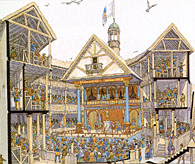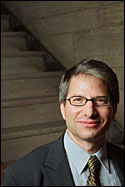The Bard from books to boards
If the members of the Shakespeare and Performance Research Team have their way, all the world will be their stage, and we all can be bit players.
 London's Globe Theatre
London's Globe Theatre |
|
The team is made up of an interdisciplinary jumble of scholars from McGill and Concordia University, and theatre practitioners from the National Theatre School and elsewhere. Over years, the McGill members have examined the gamut of Shakespeare: the carnivalesque, French translations, cross-cultural adaptations, and mass media versions of the plays. They have plans to add a high-tech theatre and innovative web use to their realm.
English professor Paul Yachnin is the team director and McGill's first Tomlinson Professor of Shakespeare Studies. Before joining our staff this year, he taught at Wilfrid Laurier and University of British Columbia. "When I was 14, I said I was going to be a literature professor," Yachnin says. "It's a vocation."
Over the next three years, Yachnin says that the team will focus on the history, properties, and settings of Shakespearean character. They'll explore Shakespeare's techniques of characterization, and ponder how generations of readers and spectators, performers and critics have interpreted and identified with his characters.
Yachnin feels that the historical and theoretical study of Shakespeare's characters will serve performance in much the same way the study of anatomy served Italian Renaissance artists. A deeper comprehension of what lies below the surface only makes the artistic rendering stronger.
Yachnin was an undergrad at McGill in the seventies. "Theory was strong, we read [seminal philosopher Michel] Foucault in third year -- no one knew who Foucault was then!" But he never took one of Professor Michael Bristol's courses. Now they work together. (Some years ago, on a flight to a conference, he read Bristol's Big-Time Shakespeare, and realized that was the book he wished he'd written himself.)
"There's always been a high undergraduate Shakespeare component at McGill," Bristol says. In the early nineties, then-colleague John Ripley got funding from Fondation des chercheurs et d'aide à la recherche (FCAR) and encouraged a real rapprochement between the literary theorists and the theatre historians, and held frequent colloquiums. Later on, Bristol took over the funding applications.
The FCAR booty meant they could fund travel for students to go to Washington D.C.'s Folger Shakespeare Library, "the best in the world," Bristol says. Many fine papers and conference presentations came out of that work. "We saw what it did for graduate students -- it was absolutely phenomenal!" he adds. "The students felt 'we were not just country cousins from Quebec, we can play in this league.'"
One graduate student who benefitted from the opportunity is Wes Folkerth, who joined the team as a professor in 2001.
Getting the theatre practitioners and theorists working together can be "like getting two shy kids at a junior high school dance to dance already!" says Folkerth. Each side wonders what the other can offer, and what they can offer the other.
Unlike a team of scientists with a clearly defined goal, the Shakespeare project members have varied threads of research, and many strong opinions, Folkerth says. "We had to find an issue we can all speak to, yet comprehensive enough for all of us to fit in."
Yachnin is applying for a Canada Foundation for Innova-tion grant to put together a centre for study that will include three interrelated facilities.
One is an electronic theatre archive of all the playbooks, annotated scripts from the actual productions, actors' diaries, illustrations, reviews, set designs, audio and DVD versions of film and theatre performances.
As well, they'd set up a computer lab for reconstructing virtual historical performances. Not to replicate them, stresses Yachnin. "We'll be speculating, engaging in the past through archives."
Most excitingly, they plan to build a small experimental theatre, in which they can work with actors on what it's like to inhabit a Shakespeare character. With the aid of computer-generated effects, the space could look and sound like different playhouses of yore. It will be possible to produce versions of past theatrical performances using actors, directors and designers, all working with the researchers. Maybe the theorists themselves would tread the boards.
In the spirit of the vernacular, anyone can be a groundling at the McGill team's show.
 Tomlinson Professor of Shakespeare Studies Paul Yachnin
Tomlinson Professor of Shakespeare Studies Paul YachninPHOTO: Claudio Calligaris |
|
The website will include public space for electronic conversations. Quebec performers and companies will engage the academy and vice versa.
Professor Leanore Lieblein says that the theatre will let them really explore the dynamic modes of performance, to complement the historical dimensions of their research and teaching.
Lieblein has been at McGill since the sixties, and is involved with the Centre International d'Ethnoscénologie in Paris, rubbing elbows with anthropologists, psychologists and performers. Ethnoscenology, coined in 1995 at the Paris UNESCO headquarters, is the study of performance from around the world.
"The body is the instrument of creation of a character," Lieblein says, "and the body of a performer is read differently in different cultures."
Analyzing the gestural in performance is not new, however. John Bulwer's 1644 Chirologia describes and draws hand gestures (chirograms) that express emotional states of being.
Looking at theatre from other cultures can provide insight. For example, in Indonesia, there are day-long performances that the audience visits and leaves as they please, just like the model for medieval pageants. As with Shakespeare, Lieblein says the "theatre's there for the community but not captive to it."
Lieblein has explored the central role the bard plays in her home province. "With the growth of the nationalist movement, Quebec demonstrated its cultural autonomy by drawing on other playwrights. That's when they approached Shakespeare to cut him down to size, to mock, use and rewrite him."
In 1977, Jean-Pierre Ronfard's Lear, showed a king with a wooden crate for a throne, a baseball cap crown, dividing his kingdom -- a pizza. Robert Gurik's 1968 Hamlet, prince du Québec featured Hamlet as the indecisive Quebec and Polonius as then–Prime Minister Lester B. Pearson. The ghost of Hamlet's father? Charles de Gaulles...
Today the politics have softened, but Quebecers are still at the vanguard of Shakespearean productions. In 2001, Nouveau Théâtre Expérimental (directed again by Ronfard) staged Dave veut jouer Richard III, in which Dave Richer, an actor with cerebral palsy, stars as the deformed King Richard. The play confronts audiences with their own ideas about what the Shakespearean body is supposed to be.
Scholars also shed light on Shakespeare's work by trying to understand the bard's environment and the Elizabethan gospel of the day. For example, Yachnin says, falling in love was not just a metaphor for the Elizabethans -- love was literally an ocular infection in which spirits enter the eye, soften the blood and make an imprint upon the heart.
Folkerth approaches the text like an archaeologist examines a shard of pottery. From a fragment, he must reconstruct the robust lived experience of all those involved in the play, from actors to audience, he says.
A musician, Folkerth is interested in sound in Shakespeare. When characters talk of sound or listening, he says, they tell us what people wanted to hear, or even mirrored sermons of the day.
He also turns to others who approached Shakespeare's text with an ear, be it Edward Capell, who inserted sound and stage directions into the plays in the 18th century, or William Poel, from the turn of the last century, who tried to stage Shakespeare using authentic Elizabethan accents. "I'm less interested in how close he got, but that he tried, the relationship he had with the words."
Shakespeare's spell has gripped readers for centuries. Bristol says, "undergrads are surprised by how powerfully they connect to the stories on an emotional level. Surprised because it engages with their feelings, the way characters engage with one another." For example, "In King Lear, Cordelia risks telling the truth to her father. Readers can say, 'oh yeah, that's what it would feel like if I were brave enough to tell my father what I thought."
Shakespeare was able to tune into issues, problems, emotional situations that we run into over the course of our lives, Folkerth says. There's the youthful head-over-heels love of Romeo and Juliet, the middle-aged ambition of Macbeth, the elderly reflection of King Lear. "People keep reading, and it's like he was there, articulating life's experience," he says.
The members of the Shakespeare Research and Performance Team are: (from McGill) Michael Bristol, Wes Folkerth, Leanore Lieblein, Patrick Neilson, Denis Salter, Myrna Wyatt Selkirk, Paul Yachnin; (from Concordia) Kevin Pask, Eve Sanders. Adjunct members: Christine Adaire, Sherry Bie (National Theatre School); Bill Glassco (Montreal Young Company), Gordon McCall (Centaur Theatre).

